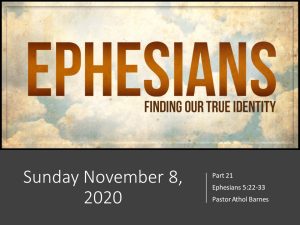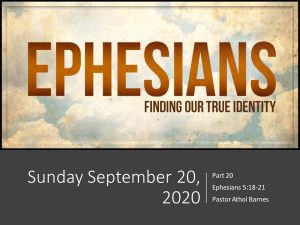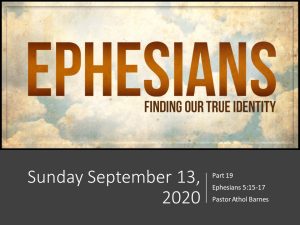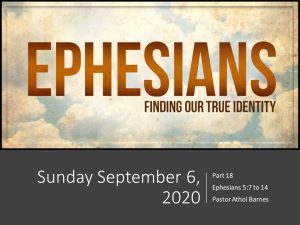
Ephesians 5:22-33
The starting point for discussing any relationship is found in Ephesians 5:18-21. Living a Spirit-filled life leads to healthy relationships and communities.
Ephesians 5:22 to 24 has been challenged, thrown out, and ignored, because it doesn’t seem to sit well with our 21st century, post-modern, post-sexual revolution era. However, I believe it is extremely relevant to our culture. This passage gives us instruction in Spirit-filled marriages and the eternal purpose of God in marriage.
Sadly, in the 21st century, we must define marriage as it has been torn apart and challenged by our secular society. Marriage is ordained by God for an eternal purpose; thus, Satan hates marriage and has a specific purpose in destroying marriage.
John Stott wrote a definition of marriage: “Marriage is an exclusive heterosexual covenant between one man and one woman, ordained and sealed by God preceded by the leaving of parents, consummated in sexual union, issuing in a permanent mutually supportive partnership, and normally crowned with the gift of children”
In Ephesians 5:22-24 Paul addresses wives: “Wives, submit to your own husbands, as to the Lord. 23 For the husband is the head of the wife even as Christ is the head of the church, his body, and is himself its Savior. 24 Now as the church submits to Christ, so also wives should submit in everything to their husbands.”
Our culture struggles with this language of submission, but this is not about subjection or controlling power. Rather, as followers of Jesus, every aspect of our life is about submission.
The key is in verse 25; a wife is called to submit to her husband who in turn is willing to die for her.
“While some may view submitting to one’s husband’s authority as something negative, a more accurate way of looking at marital roles is to understand that wives are called to follow their husband’s loving leadership.” – Andreas Kostenberger.
Husbands and wives have equal value, but different roles within marriage. When both are fulfilling their roles, marriage is a beautiful thing to observe. If we struggle with these verses, we have to go back to the basics, this is God’s authoritative word to us and He does not instruct us to do anything that is outside of His perfect nature and for our good.
We must be careful to reject any teaching that says that women are subservient to men, or that the husband is a form of a CEO in the marriage. Submission must be voluntary and follows sacrificial love. Christian wives freely follow the loving leadership of a faithful husband, they should not be forced to do so for a tyrannical husband.
What does it mean to submit? To put the will of the other person ahead of your own, to prefer the other person.
What does it mean to love? To put the needs of the other person ahead of your own needs, to prefer one another.
Love and submission are two sides of the same coin.
In Ephesians 5:25-33 Paul addresses husbands.
The first instruction we find is that Husbands are to display Christ-like love. Christlike love is a sacrificial love, it is the love that took Jesus to the cross to give his own life for the church.
Men, marriage is a call to die to self. It is daily giving yourself away for the good of your bride. It is sacrificial and preferential love.
You cannot love your wife like Christ loved the church and be passive. This is loving by serving and giving of your time and energy.
It is also a sanctifying love, as we see in verse 26. This does not mean that a husband can atone for sins, only Jesus can do that. But men are to be the spiritual leader in the home. Encouraging their wife and children to read and to allow the word of God to bring transformation.
Married men, are our wives more like Christ because she’s married to us?
Or is she more like Christ in spite of us?
Husbands are instructed to prefer their wives and care for her emotional and physical needs as we read in verse 28 and 29. The husbands’ role is not to simply occupy the couch and expect to be waited on. Our role is to care for the health and the needs of our spouse as we would care for our own bodies.
So that is the passage as it is traditionally taught, but there is a greater and more important message in this text. There is an eternal purpose in marriage.
The key is found in verse 32, “This mystery is profound, and I am saying that it refers to Christ and the church.” Paul writes that this mystery is profound and beyond our understanding. When God created the world, and the covenant of marriage, he had Christ and the church in mind. Not the other way round.
Christ loves the church (v25), he gave his life for the church (v25), he sanctifies the church (v26), he cleanses the church (v26), he will present the church in splendor (v27), he provides and cares for the church (v29).
Marriage is not the ultimate, Christ is. If, the starting point for marriage is my own selfish desires, then I am starting at the wrong place. Marriage exists for the glory of Christ.
Marriage in this life is a shadow of the ultimate marriage of Christ and his bride the church. Christ is ultimate, not our husbands or our wives, our primary loyalty must be to Jesus.
Marriage is ordained by God for the glory of God. Therefore, He is the source of love and the only one who can cause a marriage to flourish and proclaim Christ to the World. The eternal purpose of marriage is to point us to the Gospel message. The church submitting to the headship of Christ, and Christ who already gave his life for the church. Christ is now sanctifying the church, his bride and preparing her for his return and the great marriage feast (Revelation 19).
As followers of Jesus, we need to celebrate marriage, we must pray for marriages, we must fight for marriages, because they have eternal significance.










